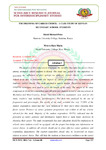The dilemma of career choice: a case study of Kenyan secondary school students
Abstract
The purpose of this study was to investigate the variables that influence career choice
among secondary school students in Kenya. The study was guided by two objectives: to
determine the influence of peer groups on students’ career choice at secondary
school level and to determine the impact of career guidance and information on
students’ career choice. The study adopted a survey design. Purposive and random
sampling techniques were used to select the sample of the study. The sample of the study
comprised of 24 teacher-counsellors and 240 form four students in twelve selected schools in
Machakos and Kitui Counties, Kenya. Two data collection instruments were used for this
study; teachers’ and students’ questionnaires. The data was analyzed by the use of
frequencies and percentages. The results of the study revealed that only 17.50% of the
student respondents stated that they were influenced by their peers when choosing their
future career. Presence of career guidance programmes was evident in all the schools
selected for this study. Majority of the student respondents (89.5%) indicated that the
provision of career guidance and information helped them to make better decisions in
choosing their career. The study recommends that peer education should be emphasized in
schools since students would be equipped with the proper knowledge and information on
career choice. In addition all schools should put in place effective career guidance and
counselling departments. The teacher-counsellors should also be in-serviced on issues
related to career choice. This will help the students to have more confidence on the career
guidance services provide in schools and thus assist them to make proper decisions when
selecting their careers.
Collections
- School of Education [203]

